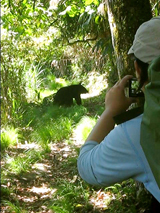A short film shot by a local wildlife research team featuring a Formosan black bear in its natural habitat was screened on Monday, thrilling bear enthusiasts.
A professor from National Dong Hwa University in Hualien County, Wu Hai-yin (吳海音), and a team of researchers came across the bear on May 20 as they were conducting a field survey along a mountain trail in Yushan National Park’s Walami-Dafen area, park rangers said.
The film was shown at the Yushan National Park Administration office in Nantou County.

PHOTO COURTESY OF YUSHAN NATIONAL PARK ADMINISTRATION
“This marked the first time in recent memory that researchers have managed to capture dynamic images of this rare animal on a mountain trail in the park,” said Su Chih-feng (蘇志峰), a section chief at the park administration.
The researchers were quoted as saying that they did not disturb the shy animal when they spotted it because they were walking quietly along the Walami Trail.
Hiding themselves in trees and bushes, the researchers shot the bear’s movements from about 10m away.
BUMP IN THE NIGHT
The four researchers stayed overnight in a Walami mountain hut and heard an animal wandering outside, but did not see it when they left the following morning.
Su said the Walami-Dafen region has been a center for research on the Formosan black bear, which is an endangered species.
The park administration has spared no effort over the past decade in helping with research on the Formosan black bear by catching and tagging the animals and installing automated video equipment in their habitats, Su said.
Researchers hope to learn more about the endemic animal species, whose survival is threatened by poaching and habitat encroachment.
OTHER EVIDENCE
A research team from National Pingtung University of Science and Technology took pictures from a distance of a mother bear leading two cubs through a river in the Dafen area in January, Su said.
Earlier this month, Su said some park rangers detected fresh bear dung in a Walami hut and that some tourists also reported to the administration that they spotted fresh bear dung at a bridge near the start of the mountain trail, indicating that the animals are thriving in the region.

The first global hotel Keys Selection by the Michelin Guide includes four hotels in Taiwan, Michelin announced yesterday. All four received the “Michelin One Key,” indicating guests are to experience a “very special stay” at any of the locations as the establishments are “a true gem with personality. Service always goes the extra mile, and the hotel provides much more than others in its price range.” Of the four hotels, three are located in Taipei and one in Taichung. In Taipei, the One Key accolades were awarded to the Capella Taipei, Kimpton Da An Taipei and Mandarin Oriental Taipei. Capella Taipei was described by

EVA Airways today confirmed the death of a flight attendant on Saturday upon their return to Taiwan and said an internal investigation has been launched, as criticism mounted over a social media post accusing the airline of failing to offer sufficient employee protections. According to the post, the flight attendant complained of feeling sick on board a flight, but was unable to take sick leave or access medical care. The crew member allegedly did not receive assistance from the chief purser, who failed to heed their requests for medical attention or call an ambulance once the flight landed, the post said. As sick

Minister of Economic Affairs Kung Ming-hsin (龔明鑫) yesterday said that private-sector refiners are willing to stop buying Russian naphtha should the EU ask them to, after a group of non-governmental organizations, including the Centre for Research on Energy and Clean Air (CREA), criticized the nation’s continued business with the country. While Taiwan joined the US and its Western allies in putting broad sanctions on Russia after it invaded Ukraine in 2022, it did not explicitly ban imports of naphtha, a major hard-currency earner for Russia. While state-owned firms stopped importing Russian oil in 2023, there is no restriction on private companies to

INDUSTRY: Beijing’s latest export measures go beyond targeting the US and would likely affect any country that uses Chinese rare earths or related tech, an academic said Taiwanese industries could face significant disruption from China’s newly tightened export controls on rare earth elements, as much of Taiwan’s supply indirectly depends on Chinese materials processed in Japan, a local expert said yesterday. Kristy Hsu (徐遵慈), director of the Taiwan ASEAN Studies Center at the Chung-Hua Institution for Economic Research, said that China’s latest export measures go far beyond targeting the US and would likely affect any country that uses Chinese rare earths or related technologies. With Japan and Southeast Asian countries among those expected to be hit, Taiwan could feel the impact through its reliance on Japanese-made semi-finished products and